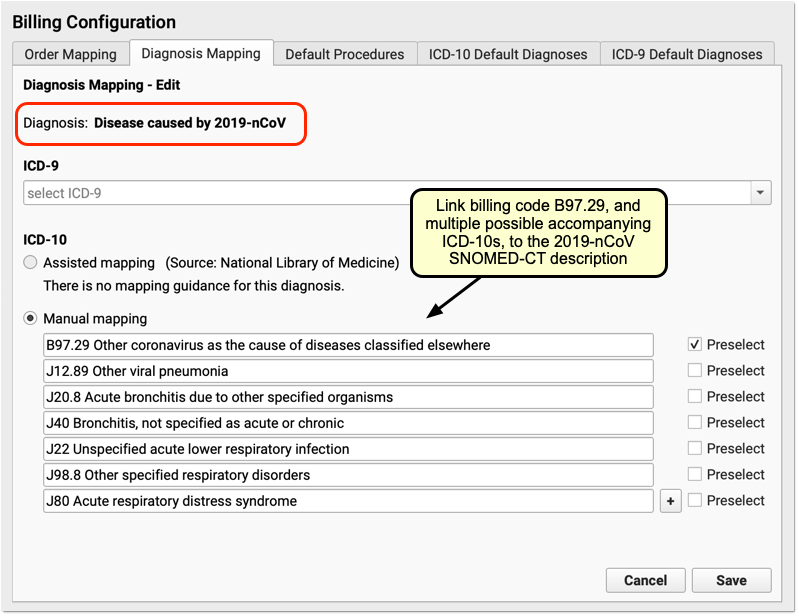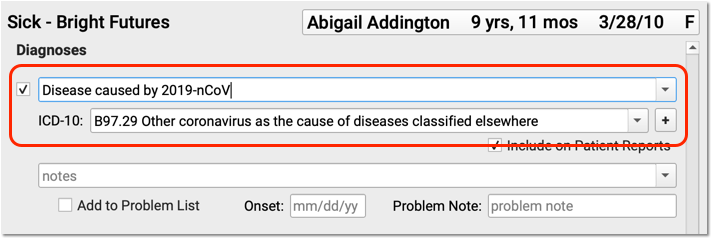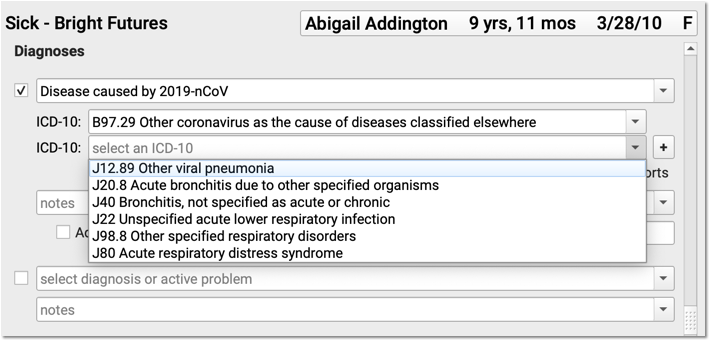March 2020 SNOMED-CT Update Adds COVID-19 Diagnosis and More
On March 19, 2020, PCC updated the SNOMED-CT diagnostic terms on your practice’s PCC system to add the COVID-19 diagnosis.
PCC regularly updates your system’s ICD-10, LOINC, SNOMED-CT, NDC, RVU, VIS, and other standardized lists so you won’t encounter challenges when you chart, order a lab, interface with a care provider, or bill for a visit. (Your practice’s local system automatically updates your practice’s procedure codes.)
We decided to push the most recent SNOMED-CT codes and descriptions out as an immediate patch in order to provide practices with the new COVID-19 diagnosis.
Read the sections below to learn more.
Contents
COVID-19 Diagnosis
This update includes language and coding for a COVID-19 diagnosis.
-
840539006 Disease caused by 2019-nCoV: This diagnosis has alternate, searchable names of “Disease caused by 2019 novel coronavirus” and “Disease caused by Wuhan coronavirus”.
If your practice needs to diagnose COVID-19, you can select this diagnosis on a chart note and/or add it to a patient’s Problem List.
What ICD-10 Code Do I Use for COVID-19?
On Thursday, March 19th, the CDC announced an unusual addition of a new ICD-10 code mid-cycle, making a new COVID-19 code effective as of April 1st, 2020:
- U07.1 COVID-19
This code’s title has also appeared as “2019-nCoV acute respiratory disease”.
Prior to U07.1 COVID-19, the CDC recommends using specific codes for Pneumonia, Bronchitis, Lower Respiratory Infection, Respiratory Infection NOS, and ARDS, which you would add to a claim along with B97.29 Other coronavirus as the cause of diseases classified elsewhere. As always, payer response may vary.
PCC keeps an up-to-date handout with COVID-19 coding and billing recommendations here: 2020 COVID-19 Coding Guide. We will update that PDF link as the situation changes and we learn more.
Your practice can use the Billing Configuration tool to directly map one or more ICD-10 codes to a SNOMED diagnosis description.
For example, you could set up the Disease caused by 2019-nCoV code to automatically provide a selection of ICD-10 specific codes. In the configuration tool, you’d add codes to the ICD-10 mapping field:

When the clinician selects the diagnosis, they can choose the additional, specific codes to accompany B97.29:


New Favorites Available in Diagnosis Quick Search
The SNOMED-CT update adds 2600 diagnosis descriptions to your system. PCC added 78 of them to the “Favorites” quick search feature of all diagnosis fields in PCC EHR.
In preparation for the update, PCC’s certified coder, Jan Blanchard, assembled a list of 78 new SNOMED-CT descriptions of interest to pediatricians. The update added these diagnoses, which include the COVID-19 diagnosis, to your practice’s default Favorites list for quick searching, unless your practice has specifically requested otherwise.
What is a diagnosis 'Favorites' list?: As you type or search in any diagnosis field, PCC EHR automatically searches a customizable list of Favorites. Use the Diagnosis Configuration tool to adjust your practice’s list of Favorites. You can also right-click on any diagnosis field in PCC EHR to search your system’s full SNOMED-CT diagnosis library.
| Abnormal hair finding | Acquired stenosis of left nasolacrimal duct | Acquired stenosis of right nasolacrimal duct |
| At increased risk of emergency hospital admission | Bilateral itching of eyes | Blister of skin |
| Bronchitis co-occurrent with acute wheeze | Bronchitis co-occurrent with chronic wheeze | Bronchitis co-occurrent with wheeze |
| Chronic excoriation of skin | Cold and clammy skin | Crusting on nose |
| Disease caused by 2019-nCoV | Dislocation of digit of hand | Disorder caused by stimulant |
| Disorder due to vaping | Dry skin of abdomen | Dullness of light reflex at tympanic membrane |
| Erythema of skin of nose | Erythematous rash | Excessive crying of infant |
| Excessive menstruation with irregular cycle | Feeling abnormal | Foreign body of eye region |
| Glass foreign body in skin | Gonorrhea of lower genitourinary tract | Gonorrhea of penis |
| Hair tuft in skin of sacral region | Hard lump of breast | Harmful pattern of use of amphetamine and amphetamine derivative |
| Has special educational needs | Immunization overdue | Impulse control disorder caused by stimulant |
| Intermittent allergic asthma | Itching of left eye | Itching of right eye |
| Methamphetamine withdrawal | Migration of intrauterine contraceptive device | Misuse of medication |
| Mood disorder caused by cannabis | Mood disorder caused by methamphetamine | Near fatal asthma |
| Neonatal jaundice due to ABO incompatibility | Nicotine-filled electronic cigarette user | Non-nicotine-filled electronic cigarette user |
| Obesity in adolescence | Persistent adjustment disorder | Pimple of skin |
| Puncture wound of thumb with foreign body | Puncture wound of thumb without foreign body | Pus crust on skin |
| Pustular psoriasis of palm of hand | Pustular psoriasis of sole of foot | Rash due to dribbling from mouth |
| Rash due to dribbling of urine | Rash of mouth | Rash of scalp |
| Requires vaccination against diphtheria | Requires vaccination against diphtheria-tetanus-pertussis with poliomyelitis | Requires vaccination against diphtheria-tetanus-pertussis with typhoid-paratyphoid |
| Requires vaccination against measles | Requires vaccination against mumps | Requires vaccination against pertussis |
| Requires vaccination against typhoid-paratyphoid | Rough skin | Sexually assaultive behavior |
| Site of injection normal | Splinter in ankle | Splinter in eyelid |
| Strain of rotator cuff of shoulder | Strain of tendon of hand | Synthetic cannabinoid induced mood disorder |
| Tingling pain | Transient motor tic | Vascular birthmark |
| Vesicle of skin | Waxy discharge from ear |
Deprecated SNOMED Diagnosis Descriptions
The March 2020 SNOMED-CT update removes or replaces many codes common to pediatric practices. Your practice may want to take special note of them.
-
Acute upper respiratory infection of multiple sites: This common URI diagnosis was removed from the international SNOMED-CT library as being ambiguous. Your practice may want to review alternative diagnoses and adjust chart note protocols, especially as it was often used for CQM reporting. PCC will automatically replace the term on chart note protocols for new visits with “Acute upper respiratory infection”, and there are several related URI descriptions available.
-
Lactose intolerance: PCC’s pediatric practices frequently used this SNOMED-CT diagnosis. It was removed from the SNOMED-CT library in favor of the more specific “Malabsorption syndrome due to intolerance to lactose”. PCC will automatically update your chart note protocols for new visits if this item appears as a default.
-
Infantile seborrheic dermatitis: This SNOMED-CT diagnosis, one of many formal names for “cradle cap”, was removed from the SNOMED-CT library. If your practice used it on a chart note protocol, the update will automatically replace it with “Generalized seborrheic dermatitis of infants”.
Here are the top 25 codes from PCC’s pediatric practices that have been removed from the SNOMED-CT diagnosis library in 2020. When these codes appeared for selection on a chart note protocol, PCC added a replacement. For other diagnoses, your providers may easily find related descriptions with a search, but you may want to plan ahead.
| Acute upper respiratory infection of multiple sites | 78337007 |
| Lactose intolerance | 267425008 |
| Infantile seborrheic dermatitis | 200776003 |
| Chesty cough | 161929000 |
| Acute wheezy bronchitis | 275499005 |
| Dysfunctional uterine bleeding | 19155002 |
| Fatigue – symptom | 272060000 |
| Pink eye disease | 241759005 |
| Pulled elbow | 95854004 |
| Oral contraceptive prescribed | 169472004 |
| Vesicular eczema of hands and/or feet | 402567004 |
| Periorbital and/or eye pain | 43751000119109 |
| Maternal drug abuse | 169941005 |
| Superficial bruising | 270911002 |
| Wry neck/torticollis | 270476009 |
| Newborn | 46068001 |
| Facial eczema | 43523005 |
| Hyperkeratosis | 396228006 |
| Genetic syndrome | 290028006 |
| Fall down stairs | 414188008 |
| Eczema of leg | 309258000 |
| Uncomplicated umbilical hernia | 196867008 |
| Tiredness symptom | 267031002 |
| Feeling tired | 314109004 |
| Sprain, ankle joint, medial | 209531007 |
SNOMED Codes Mapped to ICD-10 for Billing
The SNOMED-CT update includes new mappings to ICD-10 billing codes. Many previous mappings have been updated.
You may wish to review billing configuration for your diagnoses. You can open the Billing Configuration tool to configure which ICD-10 diagnoses are mapped to each SNOMED-CT description in PCC EHR. You can also use the snomedmap report to examine your practice’s diagnoses that may need updating.
